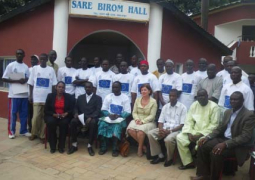PROMOTION OF UNITY
Unity is a further quality that may be influential in the course of civil emergence.
This quality has been heeded from the very beginning of the Prophet’s (s) invitation.
In various verses, the Holy Quran invites Muslims to unity. By making monotheism (tawhidi) a central issue, the Quran invites everyone to adhere to God or ‘grasp the rope of Allah’;
Hold fast, all together, to Allah’s cord, and do not be divided [into sects]. (Surah Al ‘Imran 3:103)
Through Islam, the Holy Prophet (s) was able to rapidly create peace and tranquillity among tribes that had backgrounds of over the hundred years of dispute, bloodshed, and war. With the unification of these tribes, he created a powerful base in Madinah.
John Davenport, a notable English scholar, has written that Muhammad (s), a simple Arab, was able to transform the small, scattered, unclothed and hungry tribes of his country into a consolidated and ordered society. He goes on to say that the Prophet (s) reintroduced the Arabs to the world as a people with novel qualities. In Davenport’s view, it was this method that overcame the emperor of Constantine, demolished that sultans of Persia, conquered Syria, Mesopotamia, and Egypt, and extended the territories of Islam from the Atlas Ocean to the coasts of the Caspian Sea and the river of Syr Darya (Davenport, 1969).
RELIGION AND CREATING A CIVILIZATION
Religion possesses a special place in the process of civil emergence. It is generally accepted that on culture or civilization can be found among any people without a type of religion. Radhankrishnan considers religion to be the heart of civilization. Radhankrishnan believes that religion is like a soul in the body of social structure (Radmanesh, 1978).
Here, two aspects of the role of religion in formation of civilization are considered:
First, divine guidance works towards the perfection of people using their natural capacities as a base. By creating changes in the thought and soul of humans, it obliterates old, constraining systems and traditions and imbues a vivacious living order.
This inspired revolution results in the improvement of economic life and the development of intellectual, industrial, artistic, and literary potentials.
Moreover, religion lays the foundation for solidarity or, in the words of Ibn Khaldun, “term spirit (asabiyyah)”. In the opinion of Ibn Khaldun, there is a direct relation between team spirit and religion (Radmanesh, 1978).
PROMOTION OF RELATIVE WELFARE
Due to the ecological conditions of Makkah, for as long as they resided there, Muslims were face with many problems in providing for their basic necessities. Also, the commercial environment in Makkah prevented lower social classes from reaching better professional positions. After the emigration to Madinah, Muslims found themselves in a new environment that offered further possibilities. In Madinah, racial and tribal prejudice, which were cases of vanity and arrogance, were less serve.
Light-skinned Persian slaves such as Salman and black Abyssinian slaves such as Bilal were equal. This equality increased to such an extent that a full-blooded Quraysh Arab did not regard it below himself to pledge brotherhood with a Bedouin Arab such as Abu Darr.
The profusion of water, palm groves, and gardens in Madinah as opposed to Makkah induced the Muhajirun to become farmers and gardeners. In this way, they could obtain the basic necessities of life. Institution of relative welfare in the society mean that basic necessities were ensured, and this in turn meant that the further development of society could now naturally take place.
The theoretical and practical systems of the holy Prophet (s) valued work and economic activity as well as workers and labourers (Motahhari, 1983). This was an instrumental factor in economic growth and relative welfare of the first few years of the Muslim presence in Madinah.
SUMMARY AND CONCLUSION
To conclude, the organised Islamic society in Madinah al-Nabi possessed all the necessary qualities for commencement of its civilization movement.
Therefore, the presence of the holy Prophet (s) in Madinah and subsequent formation of government must be considered the next logical measure after his appointment and invitation on the course of shaping an Islamic civilization. With the favourable reception of the people of Yathrib (modern Madinah), the holy Prophet (s) founded his civilization on tolerance, generosity and magnanimity (sa’at al-sadr) as well as mutual understanding, compassion, peaceful coexistence and negation of tyranny. The inimitable role of the great Prophet (s) in the formation and development of Islamic civilization is a significant matter and therefore requires more thorough and in-depth research. Thus, it seems that this great endeavour must be followed up by experts in the field who can fittingly illuminate the multifarious aspects of the great Prophet (s) role.
The End.
Unity is a further quality that may be influential in the course of civil emergence.
This quality has been heeded from the very beginning of the Prophet’s (s) invitation.
In various verses, the Holy Quran invites Muslims to unity. By making monotheism (tawhidi) a central issue, the Quran invites everyone to adhere to God or ‘grasp the rope of Allah’;
Hold fast, all together, to Allah’s cord, and do not be divided [into sects]. (Surah Al ‘Imran 3:103)
Through Islam, the Holy Prophet (s) was able to rapidly create peace and tranquillity among tribes that had backgrounds of over the hundred years of dispute, bloodshed, and war. With the unification of these tribes, he created a powerful base in Madinah.
John Davenport, a notable English scholar, has written that Muhammad (s), a simple Arab, was able to transform the small, scattered, unclothed and hungry tribes of his country into a consolidated and ordered society. He goes on to say that the Prophet (s) reintroduced the Arabs to the world as a people with novel qualities. In Davenport’s view, it was this method that overcame the emperor of Constantine, demolished that sultans of Persia, conquered Syria, Mesopotamia, and Egypt, and extended the territories of Islam from the Atlas Ocean to the coasts of the Caspian Sea and the river of Syr Darya (Davenport, 1969).
RELIGION AND CREATING A CIVILIZATION
Religion possesses a special place in the process of civil emergence. It is generally accepted that on culture or civilization can be found among any people without a type of religion. Radhankrishnan considers religion to be the heart of civilization. Radhankrishnan believes that religion is like a soul in the body of social structure (Radmanesh, 1978).
Here, two aspects of the role of religion in formation of civilization are considered:
First, divine guidance works towards the perfection of people using their natural capacities as a base. By creating changes in the thought and soul of humans, it obliterates old, constraining systems and traditions and imbues a vivacious living order.
This inspired revolution results in the improvement of economic life and the development of intellectual, industrial, artistic, and literary potentials.
Moreover, religion lays the foundation for solidarity or, in the words of Ibn Khaldun, “term spirit (asabiyyah)”. In the opinion of Ibn Khaldun, there is a direct relation between team spirit and religion (Radmanesh, 1978).
PROMOTION OF RELATIVE WELFARE
Due to the ecological conditions of Makkah, for as long as they resided there, Muslims were face with many problems in providing for their basic necessities. Also, the commercial environment in Makkah prevented lower social classes from reaching better professional positions. After the emigration to Madinah, Muslims found themselves in a new environment that offered further possibilities. In Madinah, racial and tribal prejudice, which were cases of vanity and arrogance, were less serve.
Light-skinned Persian slaves such as Salman and black Abyssinian slaves such as Bilal were equal. This equality increased to such an extent that a full-blooded Quraysh Arab did not regard it below himself to pledge brotherhood with a Bedouin Arab such as Abu Darr.
The profusion of water, palm groves, and gardens in Madinah as opposed to Makkah induced the Muhajirun to become farmers and gardeners. In this way, they could obtain the basic necessities of life. Institution of relative welfare in the society mean that basic necessities were ensured, and this in turn meant that the further development of society could now naturally take place.
The theoretical and practical systems of the holy Prophet (s) valued work and economic activity as well as workers and labourers (Motahhari, 1983). This was an instrumental factor in economic growth and relative welfare of the first few years of the Muslim presence in Madinah.
SUMMARY AND CONCLUSION
To conclude, the organised Islamic society in Madinah al-Nabi possessed all the necessary qualities for commencement of its civilization movement.
Therefore, the presence of the holy Prophet (s) in Madinah and subsequent formation of government must be considered the next logical measure after his appointment and invitation on the course of shaping an Islamic civilization. With the favourable reception of the people of Yathrib (modern Madinah), the holy Prophet (s) founded his civilization on tolerance, generosity and magnanimity (sa’at al-sadr) as well as mutual understanding, compassion, peaceful coexistence and negation of tyranny. The inimitable role of the great Prophet (s) in the formation and development of Islamic civilization is a significant matter and therefore requires more thorough and in-depth research. Thus, it seems that this great endeavour must be followed up by experts in the field who can fittingly illuminate the multifarious aspects of the great Prophet (s) role.
The End.




